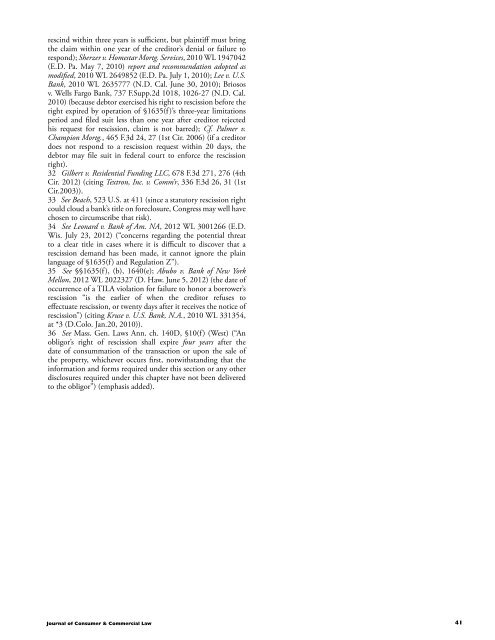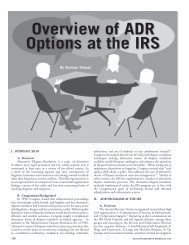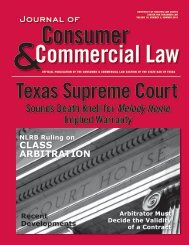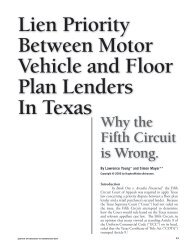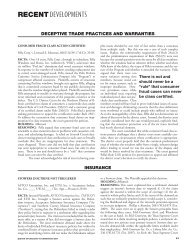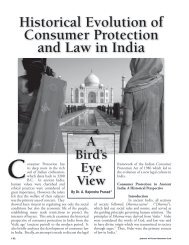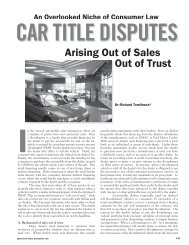Teaching Consumer Credit Law in an Evolving Australian Economy
Teaching Consumer Credit Law in an Evolving Australian Economy
Teaching Consumer Credit Law in an Evolving Australian Economy
You also want an ePaper? Increase the reach of your titles
YUMPU automatically turns print PDFs into web optimized ePapers that Google loves.
esc<strong>in</strong>d with<strong>in</strong> three years is sufficient, but pla<strong>in</strong>tiff must br<strong>in</strong>g<br />
the claim with<strong>in</strong> one year of the creditor’s denial or failure to<br />
respond); Sherzer v. Homestar Mortg. Services, 2010 WL 1947042<br />
(E.D. Pa. May 7, 2010) report <strong>an</strong>d recommendation adopted as<br />
modified, 2010 WL 2649852 (E.D. Pa. July 1, 2010); Lee v. U.S.<br />
B<strong>an</strong>k, 2010 WL 2635777 (N.D. Cal. June 30, 2010); Briosos<br />
v. Wells Fargo B<strong>an</strong>k, 737 F.Supp.2d 1018, 1026-27 (N.D. Cal.<br />
2010) (because debtor exercised his right to rescission before the<br />
right expired by operation of §1635(f)’s three-year limitations<br />
period <strong>an</strong>d filed suit less th<strong>an</strong> one year after creditor rejected<br />
his request for rescission, claim is not barred); Cf. Palmer v.<br />
Champion Mortg., 465 F.3d 24, 27 (1st Cir. 2006) (if a creditor<br />
does not respond to a rescission request with<strong>in</strong> 20 days, the<br />
debtor may file suit <strong>in</strong> federal court to enforce the rescission<br />
right).<br />
32 Gilbert v. Residential Fund<strong>in</strong>g LLC, 678 F.3d 271, 276 (4th<br />
Cir. 2012) (cit<strong>in</strong>g Textron, Inc. v. Comm’r, 336 F.3d 26, 31 (1st<br />
Cir.2003)).<br />
33 See Beach, 523 U.S. at 411 (s<strong>in</strong>ce a statutory rescission right<br />
could cloud a b<strong>an</strong>k’s title on foreclosure, Congress may well have<br />
chosen to circumscribe that risk).<br />
34 See Leonard v. B<strong>an</strong>k of Am. NA, 2012 WL 3001266 (E.D.<br />
Wis. July 23, 2012) (“concerns regard<strong>in</strong>g the potential threat<br />
to a clear title <strong>in</strong> cases where it is difficult to discover that a<br />
rescission dem<strong>an</strong>d has been made, it c<strong>an</strong>not ignore the pla<strong>in</strong><br />
l<strong>an</strong>guage of §1635(f) <strong>an</strong>d Regulation Z”).<br />
35 See §§1635(f), (b), 1640(e); Abubo v. B<strong>an</strong>k of New York<br />
Mellon, 2012 WL 2022327 (D. Haw. June 5, 2012) (the date of<br />
occurrence of a TILA violation for failure to honor a borrower’s<br />
rescission “is the earlier of when the creditor refuses to<br />
effectuate rescission, or twenty days after it receives the notice of<br />
rescission”) (cit<strong>in</strong>g Kruse v. U.S. B<strong>an</strong>k, N.A., 2010 WL 331354,<br />
at *3 (D.Colo. J<strong>an</strong>.20, 2010)).<br />
36 See Mass. Gen. <strong>Law</strong>s Ann. ch. 140D, §10(f) (West) (“An<br />
obligor’s right of rescission shall expire four years after the<br />
date of consummation of the tr<strong>an</strong>saction or upon the sale of<br />
the property, whichever occurs first, notwithst<strong>an</strong>d<strong>in</strong>g that the<br />
<strong>in</strong>formation <strong>an</strong>d forms required under this section or <strong>an</strong>y other<br />
disclosures required under this chapter have not been delivered<br />
to the obligor”) (emphasis added).<br />
Journal of <strong>Consumer</strong> & Commercial <strong>Law</strong> 41


